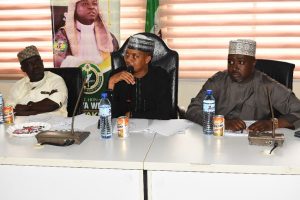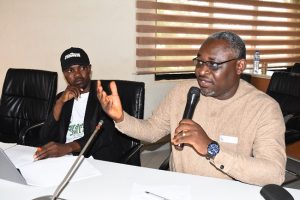The Adamawa State House of Assembly on August 29, 2024, held a public hearing on the State Climate Change Policy Bill. The bill, titled “A law to establish the Adamawa State Climate Change Commission to provide for the mainstreaming of climate change actions and for other matters incidental thereto”, passed the first and second readings in the State House of Assembly. It is sponsored by Yohanna Sahabo Jauro, representing Mubi South Constituency, and he doubles as the House Committee Chairman on Environment.

The public hearing is the last step in the process before the bill is passed into law and sent to the state governor for assent. The bill represents a significant milestone in the state’s efforts to address to build climate resilience and address the impact of climate change in the state especially the annual flooding and excessive heat wave the state is known for.
This achievement so far was made possible by several advocacy visits and lobby meetings by climate advocates in the state under the Adamawa Activist for Climate justice, Vote for Climate Ambassadors and CCI Volunteers using the Citizens Climate International lobby principles of building the political will for climate action.
The progress made so far underscores the belief that when ordinary citizens respectfully engage and build relationship with policy makers, progress will occur to build liveable future.
Dr Michael Terungwa David, the Executive Director GIFSEP and the Africa Regional Coordinator Citizens Climate International who made a presentation during the public hearing held in the Adamawa State House of Assembly in Yola, commended the State House of Assembly for the bold and giant steps and urged other state governments without a subnational policy on climate change to take a que from Adamawa State.

He further explained that climate policies at the sub-national level are essential because they allow for tailored, responsive, and community-driven approaches to tackling climate change. By addressing local needs, engaging citizens, and leveraging regional strengths, sub-national policies contribute significantly to achieving climate resilience, sustainable development, and the broader goals of national and global climate action.
Dr David further explained that subnational policies help in achieving localised solutions for specific climate impacts.
He said: “Different regions experience climate change in unique ways, whether it’s coastal areas dealing with sea-level rise, urban centres facing heatwaves, or rural areas experiencing droughts. Sub-national policies allow for tailored solutions that address specific climate vulnerabilities and environmental needs of each area. Sub-national climate policies help to implement and operationalise national and international climate commitments (such as those from the Paris Agreement) at the local level. They make high-level goals actionable and achievable on the ground.”
According to him, another advantage is Community Engagement and Participation as, he added, involving local communities provides opportunities for communities to have a direct say in climate action. Engaging citizens in decision-making increases public awareness, builds local ownership of climate initiatives, and ensures that policies reflect the community’s priorities and needs, he noted.
He added that climate policies at the sub-national level can promote green industries, create local jobs in renewable energy, agriculture, and sustainable infrastructure, and drive regional economic development.
Inputs were made by the Ministry of Environment, the state Coordinator of ACRESAL, as well as other government agencies and civil societies.
At the end of the public hearing, the speaker of the Adamawa State House of Assembly, Wesley Bathiya, who was represented by Umar Ismaila Daware from Fufore/Gurin Constituency, thanked all those present and reiterated the commitment of the House to get the bill passed.
The sponsor of the bill assured that all inputs, both oral and written submissions, would be considered.
